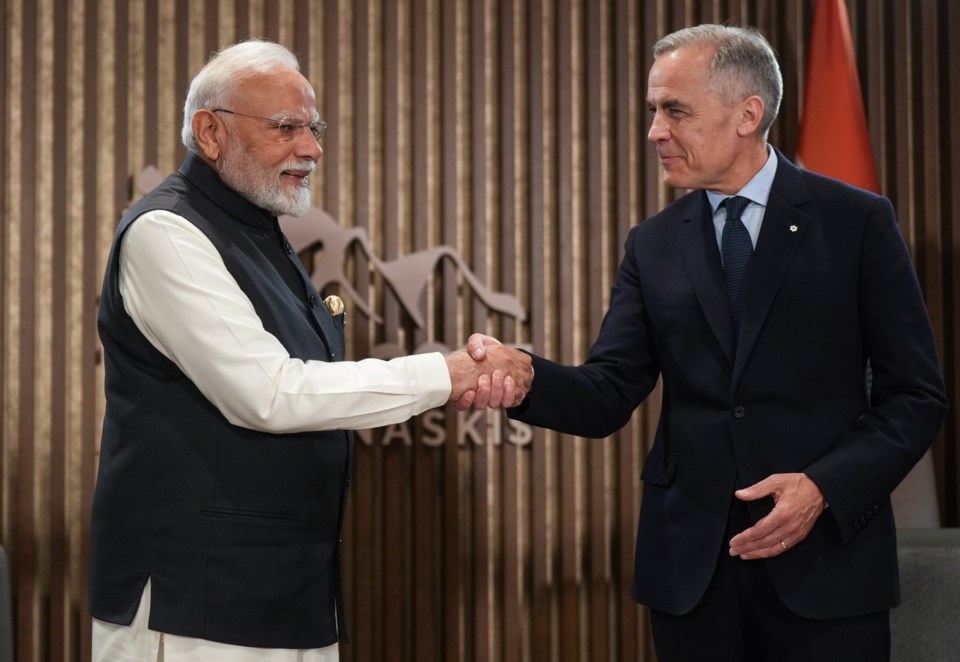OTTAWA — Indian officials and their proxy agents in Canada engage in a range of activities that seek to influence Canadian communities and politicians, the Canadian Security Intelligence Service said Wednesday in its annual report.
When such activities are deceptive, clandestine or threatening, they are deemed to be foreign interference, the report says.
"These activities attempt to steer Canada's positions into alignment with India's interests on key issues, particularly with respect to how the Indian government perceives Canada-based supporters of an independent homeland that they call Khalistan," the report says.
The report adds that the re-election of Indian Prime Minister Narendra Modi will mean India's political course will continue to follow the Hindu-nationalist policy agenda implemented since Modi was first elected in 2014.
"Modi and his core ministers and advisers are keen to build India's global influence and counter any activity they consider as 'anti-India,' at home or abroad, in the name of domestic stability and prosperity," the CSIS report says.
"With that considered, there is a long history of India arguing that Canada is a haven for 'anti-India' activity, with the separatist Khalistan movement being a particular focus of India's concern, which is rooted in the aftermath of the 1985 Air India bombing and subsequent terrorist activity in India."
The report, which was tabled in the House of Commons on June 13, comes as Canada renews diplomatic ties with India following Prime Minister Mark Carney's meeting with Modi at the G7 in Kananaskis, Alta., on Tuesday. The two leaders agreed to reappoint their respective high commissioners.
In October 2024, Canada expelled consular officials and six Indian diplomats — including the high commissioner — when they refused to co-operate with a police probe into allegations that agents of the Indian government ran a targeted campaign of criminal violence and harassment against Canadian citizens.
India responded by expelling six Canadian diplomats, including the acting high commissioner. Both high commissioner positions have been vacant since then.
A year before the diplomats were expelled, then-prime minister Justin Trudeau and the RCMP said they had credible evidence linking agents of the Indian government to the 2023 murder of Canadian Sikh-activist Hardeep Singh Nijjar in Surrey, B.C.
Wednesday was the second anniversary of his murder. Four Indian nationals have been charged with first degree murder in that case and the court process is ongoing.
At a news conference in Kananaskis on Tuesday night, Carney would not answer when asked whether he raised Nijjar's killing with Modi.
The advocacy group Sikhs for Justice said in a media release they want Carney to "publicly clarify" whether he did or did not discuss Nijjar with Modi.
Public Safety Minister Gary Anandasangaree said Canada has had "difficult conversations" with the Indian government and that will continue.
"There is no way in which a third country can come into Canada and implement, using proxies, be involved in the murder of a Canadian. And we have expressed our concerns over many months, and we will continue to do so," Anandasangaree said after the Liberal caucus meeting on Wednesday.
"It is an independent investigation that’s been undertaken by the RCMP and I think we need to wait until they complete that work."
Anandasangaree said the government condemns any attempt at foreign interference in Canada, and the RCMP's investigation into Nijjar's killing will remain an independent process.
B.C. NDP MP Jenny Kwan is calling on the government to suspend all security sharing and intelligence agreements with India and publicly call on the Modi government to "fully cooperate" with investigations into extrajudicial killings in Canada, including Nijjar's murder.
Kwan sent Anandasangaree a letter saying it is "beyond disappointing" that Carney invited Modi to the G7 as security issues with India persist.
"Continuing to engage the Modi government without full transparency and accountability undermines Canada’s credibility in defending human rights and the rule of law — both at home and abroad," Kwan wrote.
B.C. Premier David Eby said Tuesday he wants to see the Lawrence Bishnoi gang designated as a terrorist group. The RCMP have said the gang targets Sikh separatist activists in Canada on behalf of the Indian government.
Eby said Tuesday that the gang had been linked to extortion and other crimes against South Asian community members in B.C., Alberta and Ontario.
Kwan also called for the Bishnoi gang to be designated as a terrorist group in her letter.
Anandasangaree said the federal government has not yet received a formal request from Eby but he looks forward to discussing it further with the premier.
Eby shared the letter he sent to Carney, dated June 17, requesting the Bishnoi gang be designated a terrorist entity on social media Wednesday afternoon.
The minister said that security officials continually assess which groups could be added to Canada's terrorist list. He would not say if the Bishnoi gang is currently up for consideration.
"This doesn’t mean it’s an active file right now, but I will say that at all times, our security apparatus will assess the threats and whether they meet the legal threshold that’s in the Criminal Code for the listing," Anandasangaree said.
— With files from Darryl Greer and Nono Shen in Vancouver
This report by The Canadian Press was first published June 18, 2025.
David Baxter and Jim Bronskill, The Canadian Press



